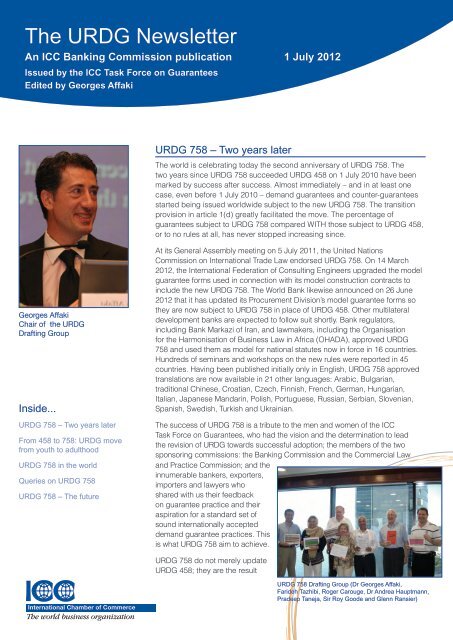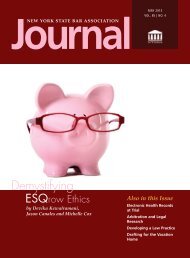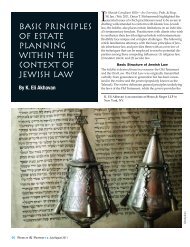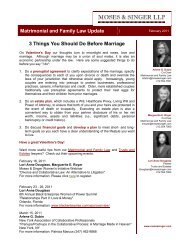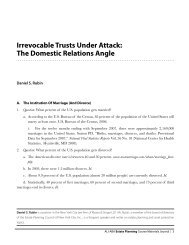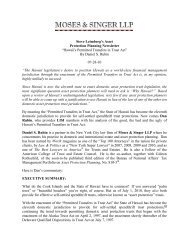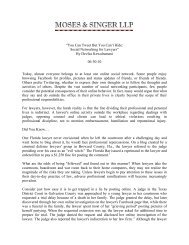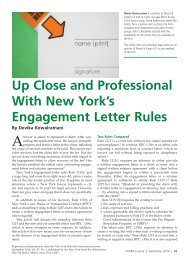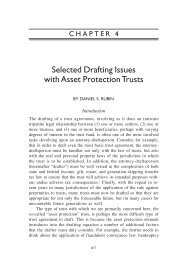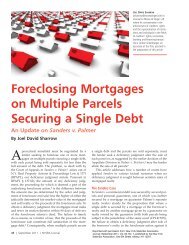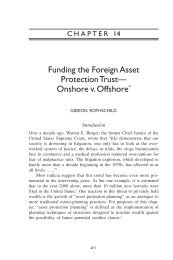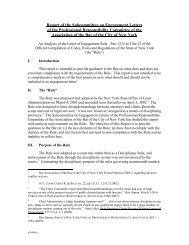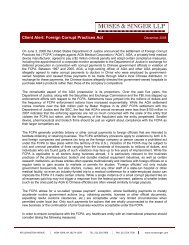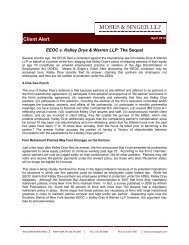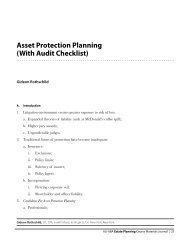The URDG Newsletter - ICC Deutschland
The URDG Newsletter - ICC Deutschland
The URDG Newsletter - ICC Deutschland
You also want an ePaper? Increase the reach of your titles
YUMPU automatically turns print PDFs into web optimized ePapers that Google loves.
<strong>The</strong> <strong>URDG</strong> <strong>Newsletter</strong><br />
An <strong>ICC</strong> Banking Commission publication 1 July 2012<br />
Issued by the <strong>ICC</strong> Task Force on Guarantees<br />
Edited by Georges Affaki<br />
<strong>URDG</strong> 758 – Two years later<br />
<strong>The</strong> world is celebrating today the second anniversary of <strong>URDG</strong> 758. <strong>The</strong><br />
two years since <strong>URDG</strong> 758 succeeded <strong>URDG</strong> 458 on 1 July 2010 have been<br />
marked by success after success. Almost immediately – and in at least one<br />
case, even before 1 July 2010 – demand guarantees and counter-guarantees<br />
started being issued worldwide subject to the new <strong>URDG</strong> 758. <strong>The</strong> transition<br />
provision in article 1(d) greatly facilitated the move. <strong>The</strong> percentage of<br />
guarantees subject to <strong>URDG</strong> 758 compared WITH those subject to <strong>URDG</strong> 458,<br />
or to no rules at all, has never stopped increasing since.<br />
Georges Affaki<br />
Chair of the <strong>URDG</strong><br />
Drafting Group<br />
Inside...<br />
<strong>URDG</strong> 758 – Two years later<br />
From 458 to 758: <strong>URDG</strong> move<br />
from youth to adulthood<br />
<strong>URDG</strong> 758 in the world<br />
Queries on <strong>URDG</strong> 758<br />
<strong>URDG</strong> 758 – <strong>The</strong> future<br />
At its General Assembly meeting on 5 July 2011, the United Nations<br />
Commission on International Trade Law endorsed <strong>URDG</strong> 758. On 14 March<br />
2012, the International Federation of Consulting Engineers upgraded the model<br />
guarantee forms used in connection with its model construction contracts to<br />
include the new <strong>URDG</strong> 758. <strong>The</strong> World Bank likewise announced on 26 June<br />
2012 that it has updated its Procurement Division’s model guarantee forms so<br />
they are now subject to <strong>URDG</strong> 758 in place of <strong>URDG</strong> 458. Other multilateral<br />
development banks are expected to follow suit shortly. Bank regulators,<br />
including Bank Markazi of Iran, and lawmakers, including the Organisation<br />
for the Harmonisation of Business Law in Africa (OHADA), approved <strong>URDG</strong><br />
758 and used them as model for national statutes now in force in 16 countries.<br />
Hundreds of seminars and workshops on the new rules were reported in 45<br />
countries. Having been published initially only in English, <strong>URDG</strong> 758 approved<br />
translations are now available in 21 other languages: Arabic, Bulgarian,<br />
traditional Chinese, Croatian, Czech, Finnish, French, German, Hungarian,<br />
Italian, Japanese Mandarin, Polish, Portuguese, Russian, Serbian, Slovenian,<br />
Spanish, Swedish, Turkish and Ukrainian.<br />
<strong>The</strong> success of <strong>URDG</strong> 758 is a tribute to the men and women of the <strong>ICC</strong><br />
Task Force on Guarantees, who had the vision and the determination to lead<br />
the revision of <strong>URDG</strong> towards successful adoption; the members of the two<br />
sponsoring commissions: the Banking Commission and the Commercial Law<br />
and Practice Commission; and the<br />
innumerable bankers, exporters,<br />
importers and lawyers who<br />
shared with us their feedback<br />
on guarantee practice and their<br />
aspiration for a standard set of<br />
sound internationally accepted<br />
demand guarantee practices. This<br />
is what <strong>URDG</strong> 758 aim to achieve.<br />
<strong>URDG</strong> 758 do not merely update<br />
<strong>URDG</strong> 458; they are the result<br />
<strong>URDG</strong> 758 Drafting Group (Dr Georges Affaki,<br />
Farideh Tazhibi, Roger Carouge, Dr Andrea Hauptmann,<br />
Pradeep Taneja, Sir Roy Goode and Glenn Ransier)
“<strong>URDG</strong> 758 are a transformation from <strong>URDG</strong> 458, a set of useful<br />
but basic provisions, into rules that address all the key issues of<br />
modern demand guarantee practice”<br />
Guide to <strong>ICC</strong> Uniform Rules<br />
for Demand Guarantees<br />
http://www.iccbooks.com/Product/<br />
ProductInfo.aspxid=659<br />
of an ambitious process that seeks to bring a new set of rules for demand guarantees<br />
that are clearer, more precise and more comprehensive. By offering a much needed<br />
clarification of the presentation and examination process and excluding imprecise<br />
standards, <strong>URDG</strong> 758 foster certainty and predictability. Examples are strict time<br />
durations for the examination of a demand, the extension of the validity period in the<br />
case of force majeure, and the suspension of the guarantee in the case of an extend<br />
or pay demand. <strong>URDG</strong> 758 are comprehensive and cover important practices that<br />
had been left out of <strong>URDG</strong> 458, including the advising of guarantees, amendments,<br />
standards for examination of presentations, partial, multiple and incomplete demands,<br />
linkage of documents and transfer of guarantees. <strong>The</strong>y endorse and build on the<br />
balanced approach that characterised <strong>URDG</strong> 458, offering the most reasonable<br />
balance between the legitimate interests of the applicant, the beneficiary and the<br />
guarantor. <strong>URDG</strong> 758 also feature a number of innovations, such as the new rule that<br />
proposes a substitution of currencies when payment in the<br />
currency specified in the guarantee becomes impossible<br />
and the new termination mechanism for guarantees that<br />
state neither an expiry date nor an expiry event.<br />
In June 2011, the rules and the accompanying model forms<br />
welcomed a companion that quickly became indispensable<br />
to all users: Guide to <strong>ICC</strong> Uniform Rules for Demand<br />
Guarantees, <strong>ICC</strong> pub 702, which is now in its second print<br />
run. With that, the world of demand guarantees has in its<br />
possession all the means necessary to have an optimised,<br />
pacified and standardised demand guarantee practice.<br />
<strong>The</strong> Task Force is proud of having contributed to this result.<br />
Happy birthday <strong>URDG</strong> 758!<br />
Dr Georges Affaki<br />
georges.affaki@bnpparibas.com<br />
<strong>ICC</strong> Uniform Rules for Demand<br />
Guarantees<br />
http://www.iccbooks.com/Product/<br />
ProductInfo.aspxid=651<br />
From 458 to 758: <strong>URDG</strong> move from youth to adulthood<br />
<strong>The</strong> first edition of the Uniform Rules for Demand Guarantees, published in 1992,<br />
was driven by the need to replace the failed URC 325. <strong>The</strong> great bulk of the work<br />
was done by a Joint Working Party of the Commission on International Commercial<br />
Practice and the Commission on Banking Technique and Practice under the<br />
chairmanship of Dr Rudolf von Graffenried. But after years of hard work the Working<br />
Party reached an impasse. This was resolved by two meetings of a Drafting Group<br />
in Paris under my chairmanship, each lasting a mere three hours, when some key<br />
issues, and in particular the requirement of a statement of breach, were resolved.<br />
<strong>URDG</strong> 458 were a good piece of work for their time, but their inadequacies gradually<br />
became apparent. Hence a new drafting group and a steering committee, both under<br />
2
“<strong>URDG</strong> 758... address all the key issues<br />
of modern demand guarantee practice”<br />
Sir Roy Goode, Emeritus Professor of Law, Oxford<br />
the inspired chairmanship of my friend and colleague Dr Georges Affaki, consulted<br />
widely and went through every single submission from <strong>ICC</strong> National Committees and<br />
others, line by line. It is interesting to reflect that the requirement of a statement of<br />
breach, much debated when first introduced, is now almost universally accepted as<br />
sound and desirable practice. With many important new provisions, <strong>URDG</strong> 758 are<br />
a transformation from a set of useful but basic provisions into rules that address all<br />
the key issues of modern demand guarantee practice and in a mere two years have<br />
gained an astonishing degree of acceptance. Floreat <strong>URDG</strong> 758!<br />
Sir Roy Goode QC, Emeritus Professor of Law, Oxford<br />
roy.goode@sjc.ox.ac.uk<br />
<strong>URDG</strong> 758 in the world<br />
<strong>The</strong> Guarantees Department at Raiffeisen Bank International led by<br />
Dr Andrea Hauptmann has studiously compiled over the past year<br />
statistics on the use of <strong>URDG</strong> 758 in the world. <strong>The</strong> figures were reported<br />
by members of the Task Force, who are spread across 26 countries.<br />
Overall, the reports show a satisfactory uptake of <strong>URDG</strong> 758, which have<br />
replaced <strong>URDG</strong> 458 in commercial transactions and seem to be going<br />
further in conquering new parts of the guarantee market, including in<br />
public procurement.<br />
Dr Andrea Hauptmann<br />
Task Force Chair<br />
In Europe, guarantees and counter-guarantees governed by <strong>URDG</strong> 758<br />
account for 20% to 70% of the aggregate guarantee volume. <strong>The</strong> leading<br />
French, Italian and Spanish banks and savings and loan institutions are<br />
reported to offer <strong>URDG</strong> guarantees and counter-guarantees by default,<br />
i.e. subject to their customers requesting an opt-out where mandatory<br />
guarantee forms are imposed by public beneficiaries. In Germany, a<br />
considerable portion of beneficiaries are reported increasingly to require<br />
that their bank guarantees be governed by <strong>URDG</strong> 758. This evolution<br />
in the German guarantee market contrasts sharply with the timid debut<br />
of <strong>URDG</strong> 458 and should be credited to the leadership of <strong>ICC</strong> local<br />
members. When asked about <strong>URDG</strong> 758’s reception in the UK, Geoffrey<br />
Wynne, a leading export finance lawyer at SNR Denton, commented<br />
“<strong>URDG</strong> 758 is slowly but surely gaining popularity here. A number of<br />
the UK banks have adopted <strong>URDG</strong> 758 as their default position. We<br />
are seeing <strong>URDG</strong> 758 guarantees in increasing numbers and have<br />
not encountered any bank unwilling to issue or accept a <strong>URDG</strong> 758<br />
guarantee or counter-guarantee.”<br />
3
“We are seeing <strong>URDG</strong> 758 guarantees in increasing numbers<br />
and have not encountered any bank unwilling to issue or accept<br />
a <strong>URDG</strong> 758 guarantee or counter-guarantee.”<br />
Geoffrey Wynne, SNR Denton<br />
In the Middle-East, reports from Turkey, Egypt and<br />
Jordan show an increase of 35% to 50% in the use of<br />
<strong>URDG</strong> 758. In Iran, the Central Bank issued a circular<br />
letter to national banks commending <strong>URDG</strong> 758. Reports<br />
by regional members of the Task Force confirmed the<br />
Shari’a-compliant character of <strong>URDG</strong> 758 and the<br />
possibility for Islamic finance-related guarantees<br />
to be governed by <strong>URDG</strong> 758. Contacts<br />
were made with Islamic development<br />
banks in the Gulf to advocate<br />
the use of <strong>URDG</strong> 758 in<br />
development financing.<br />
Mohammad M. Burjaq,<br />
Chief Operations Officer<br />
for Bank al Etihad in<br />
Jordan and a member<br />
of the Task Force<br />
reported that a higher<br />
level of use of <strong>URDG</strong><br />
758 could easily be<br />
achieved if templates<br />
get updated. Out-ofdate<br />
governmental<br />
regulations governing<br />
public procurement are<br />
often perceived as a barrier<br />
to a wider use of the new<br />
rules. Mr Burjaq conducted a<br />
considerable number of seminars in<br />
the Arab region and reported a particular<br />
interest in Arab banking and business circles in <strong>URDG</strong><br />
758 and the model forms offered in the rule brochure.<br />
In India, the Foreign Exchange Dealers’ Association<br />
(FEDAI) likewise recommended to its member banks<br />
the use of <strong>URDG</strong> 758. In Russia and PRC no national<br />
statistics were available but members of the Task<br />
Force reported that leading banks have advised their<br />
branches and subsidiaries to use <strong>URDG</strong> 758. Bank<br />
of China reported that the Supreme People’s Court<br />
of PRC is examining the possibility of updating its<br />
interpretative rulings on independent guarantees and<br />
considering <strong>URDG</strong> as a restatement of customs and<br />
practice in international guarantees. As indicated in<br />
Guide to <strong>ICC</strong> Uniform Rules for Demand Guarantees, the<br />
PRC Supreme People’s Court had previously rendered<br />
judgments applying <strong>URDG</strong> (458) even in cases where<br />
the parties had not explicitly incorporated the rules<br />
in their guarantees.<br />
Roger Carouge, Head of Global<br />
Trade Services for Deutsche<br />
Bank and a member of the<br />
<strong>URDG</strong> 758 Drafting Group,<br />
has travelled extensively<br />
throughout Asia including<br />
in PRC, Singapore, UAE<br />
and Turkmenistan to<br />
promote <strong>URDG</strong>. His<br />
report from his extensive<br />
lecturing to banks, central<br />
banks and corporate<br />
customers in the region is<br />
that all sectors embraced<br />
<strong>URDG</strong> 758 after their entry<br />
into force. Mr Carouge<br />
commented that banks prefer<br />
using <strong>URDG</strong> 758 because their<br />
standard use is perceived as<br />
reducing processing risks and therefore<br />
production cost, which ultimately would<br />
have been charged by the bank to its customer. Local<br />
bankers also reported that <strong>URDG</strong> 758 considerably<br />
lessen the length and antagonism of guarantee wording<br />
negotiation. <strong>The</strong> model forms appended to the <strong>URDG</strong><br />
758 booklet are reportedly often used for guidance.<br />
No reliable statistics were available for Africa, Australasia<br />
or the Americas. However, members of the Task Force<br />
reported regularly about <strong>URDG</strong> 758 guarantees issued<br />
or accepted in those regions. In the United States,<br />
the combined efforts of Task Force regional members,<br />
USCIB and BAFT-IFSA, as well as the leadership of a<br />
4
“<strong>The</strong> Task Force acts as the standing <strong>ICC</strong> body<br />
that monitors international guarantee practice...”<br />
number of US national banks and US branches of European banks, resulted in <strong>URDG</strong><br />
guarantees and counter-guarantees issued by or in favour of US parties. This growing<br />
success was reported by participants at numerous workshops on <strong>URDG</strong> 758 organised<br />
by banks, banking organisations and law firms in the United States. As confirmed by<br />
Michael Evan Avidon, a leading trade finance attorney in New York, a typical demand<br />
guarantee governed by <strong>URDG</strong> 758 is an “independent undertaking” to pay against<br />
documents within the meaning of Office of the Comptroller of the Currency Interpretative<br />
Ruling 12 C.F.R. § 7.1016 (revised) and, as such, is not a prohibited activity for US<br />
national banks.<br />
Mohammed Burjaq<br />
Task Force Member<br />
Compiled from contributions made by:<br />
Amr Kamal (amr.kamal_63@yahoo.com), Vasant Shanbhag<br />
(vasants@ingvysyabank.com), Mohammed Burjaq (cdcsmmb@yahoo.com),<br />
Kate Richardson (kate.richardson@snrdenton.com), Roger Carouge<br />
(roger.carouge@db.com), Michael Evan Avidon (mavidon@mosessinger.com),<br />
Zuo Yichen (js_zuoych@bank-of-china.com) and Andrea Hauptman<br />
(andrea.hauptmann@rbinternational.com).<br />
Queries on <strong>URDG</strong> 758<br />
<strong>The</strong> Task Force acts as the standing <strong>ICC</strong> body that monitors<br />
international guarantee practice and offers technical support in<br />
the use of <strong>URDG</strong> worldwide. In the two years of use of <strong>URDG</strong> 758,<br />
the Task Force received numerous queries regarding the proper<br />
interpretation of certain <strong>URDG</strong> 758 provisions. <strong>The</strong> majority of those<br />
queries were submitted before<br />
the release of Guide to <strong>ICC</strong><br />
Uniform Rules for Demand<br />
Guarantees and found an<br />
answer in the Guide. Other<br />
queries were considered by the<br />
Task Force as educational in<br />
nature or involving an ongoing<br />
dispute. Under the terms of<br />
reference of the <strong>ICC</strong> Banking<br />
Commission, no such queries<br />
can be processed as official<br />
opinions of the Commission.<br />
We release in this <strong>Newsletter</strong><br />
excerpts of those queries, given<br />
their educational value.<br />
<strong>URDG</strong> 758 Global launch conference,<br />
Paris, 18 March 2010<br />
5
If a guarantee says it will expire “on Final<br />
Acceptance”, does the three-year termination date in<br />
article 25(c) apply<br />
Q. A guarantee stipulates that it expires on a specific<br />
calendar date but that notwithstanding the expiry date,<br />
the beneficiary may present documents to the guarantor<br />
up to 30 days after the expiry date. Is it complying with<br />
<strong>URDG</strong> 758<br />
A. Article 14 provides that a presentation shall be made<br />
to the guarantor on or before expiry. After expiry, the<br />
guarantor is automatically released from its obligations<br />
under the guarantee and no longer has authority to receive,<br />
examine or act upon a presentation made after expiry. <strong>The</strong><br />
guarantee referred to in the query is in conflict with <strong>URDG</strong><br />
758 and should not be made subject to the rules.<br />
Q. A beneficiary is insisting on introducing into the<br />
guarantee a political risk clause covering the risk of<br />
currency control. <strong>The</strong> guarantor asks if there is a need for<br />
such a clause where <strong>URDG</strong> 758 apply to the guarantee.<br />
A. <strong>The</strong> independent nature of the guarantee, explicitly<br />
acknowledged in article 5, bars the guarantor from<br />
asserting a currency control regulation in the country of<br />
the applicant as a defence for not honouring its payment<br />
undertaking. A political risk clause adds little value in such<br />
a case. If the currency control is imposed in the country<br />
of the guarantor and results in the prohibition of payment<br />
in the currency of the guarantee being a foreign currency,<br />
article 21 requires the guarantor to pay in the currency of<br />
the place for payment. Admittedly, if the place of payment<br />
were in the country that has imposed the currency control,<br />
the beneficiary would have no choice but to accept<br />
payment in the local currency. <strong>The</strong> result is not any<br />
different if a political risk clause is added because it would<br />
be overridden by the mandatory character of the currency<br />
control of the place of payment. Article 21 is particularly<br />
helpful where the place of payment is outside the country<br />
that has imposed the currency control. It dispenses with<br />
the need for a separate political risk clause. More on that<br />
in the Guide, paragraphs 21.1 and following.<br />
Q. A guarantee is issued without any indication of an<br />
expiry date but stipulates one of the following clauses:<br />
“This guarantee will expiry upon Final Acceptance”, “This<br />
guarantee is valid until completion of the contract” or “This<br />
guarantee is valid until released by the beneficiary”. Does<br />
the three-year termination date in article 25(c) apply<br />
A. All three clauses stated in the query are nondocumentary<br />
conditions since they do not specify any<br />
document to indicate compliance with these conditions.<br />
Accordingly, article 7 requires that they should be<br />
disregarded except for the purpose of determining<br />
whether data that may appear in a document specified<br />
in and presented under the guarantee does not conflict<br />
with data in the guarantee. More on that in the Guide,<br />
paragraph 25.6. This query was adopted as Official<br />
Opinion 470/TA.745.<br />
Q. A counter-guarantee is issued through SWIFT MT760.<br />
Field 40C (applicable rules) indicates <strong>URDG</strong> but field 77C<br />
(details of the guarantee) indicates: “Our counter-guarantee<br />
and your guarantee will be governed by Turkish law and<br />
place of jurisdiction Istanbul”. Is there a conflict with <strong>URDG</strong><br />
articles 34 and 35<br />
A. Where the counter-guarantor has chosen the applicable<br />
law to both the counter-guarantee and the guarantee and<br />
has explicitly so indicated in the relevant field in the SWIFT<br />
message, the counter-guarantor’s choice will prevail over<br />
the default rules in <strong>URDG</strong> 758, i.e. articles 34 and 35.<br />
More on that in the Guide, paragraphs 82 and following.<br />
Q. A counter-guarantee is issued through SWIFT MT760.<br />
Field 40 C indicates NONE and field 77C indicates: “<strong>The</strong><br />
guarantee is subject to <strong>URDG</strong> 758 except articles 16, 22<br />
and 35. <strong>The</strong> counter-guarantee is subject to English law<br />
and the jurisdiction is English courts”. Is there a conflict with<br />
<strong>URDG</strong> article 1(b)<br />
A. <strong>The</strong> deliberate choice of NONE in field 40C excludes<br />
the application of <strong>URDG</strong> to the counter-guarantee and<br />
therefore overrides article 1(b). More on that in the Guide,<br />
paragraph 1.26.<br />
Q. Is a guarantor entitled to recalculate the beneficiary’s<br />
calculation in a required document and, if it considers<br />
that calculation to be incorrect, to raise a discrepancy and<br />
is a counter-guarantor entitled to recalculate and reject<br />
the guarantor’s demand if the guarantor chose not to<br />
recalculate or didn’t find any mistake<br />
A. Article 19(e) provides the guarantor with the choice<br />
as to whether it recalculates a beneficiary’s calculations<br />
under a formula stated or referenced in the guarantee. In<br />
doing so, if the guarantor finds a mistake, it may reject the<br />
demand as discrepant. <strong>The</strong> counter-guarantor is obliged<br />
to pay the guarantor that has chosen not to recalculate<br />
the beneficiary’s calculation even if the counter-guarantor<br />
6
Can a beneficiary make a second claim during an<br />
extend or pay suspension period<br />
finds a mistake in the calculation made by the beneficiary.<br />
More on that in the Guide, paragraph 19.14.<br />
Q. Is a guarantor entitled to pay an “extend or pay” demand<br />
directly, even without the consent of the instructing party<br />
A. Article 23(a) provides the guarantor with the choice to<br />
extend or to pay upon its receipt of a complying extend<br />
or pay demand. However, if it has decided to suspend<br />
payment, it has to wait for the end of the suspension<br />
period to extend or to pay. If the instructing party refuses<br />
the extension requested by the beneficiary, the guarantor<br />
remains free to extend the guarantee nonetheless but<br />
risks losing any right to be reimbursed by the instructing<br />
party for acting in breach of its mandate (unless it is<br />
authorised to do so in the application). More on that in the<br />
Guide, paragraphs 23.1 and following.<br />
Q. Is it possible for a beneficiary that has already presented<br />
a complying extend or pay demand to make a new demand<br />
for payment during the suspension period If not, is it<br />
possible for the beneficiary to withdraw the extend or pay<br />
demand and present a new demand assuming that the<br />
guarantee has not expired<br />
A.Unless the terms of the guarantee provide otherwise,<br />
article 17 permits the beneficiary to present multiple<br />
partial demands. <strong>The</strong>refore, provided that the beneficiary<br />
has not presented a complying demand for the total<br />
guarantee amount, it is still possible to present another<br />
demand for the remaining amount during the suspension<br />
period on or before the expiry date of the guarantee.<br />
If the first extend or pay demand had been made for<br />
the total guarantee amount and the guarantor found it<br />
to be a complying demand and decided to suspend<br />
payment, the beneficiary has to wait for the expiry of the<br />
suspension period that it is deemed to have accepted<br />
when presenting an extend or pay demand. If the<br />
extension is granted, its demand for payment is withdrawn<br />
automatically and it may present a new demand. If not,<br />
the guarantor has to pay so it is unnecessary for the<br />
beneficiary to present a new demand. More on that in the<br />
Guide, paragraphs 23.1 and following.<br />
Q. Is it possible for a beneficiary to make a demand under<br />
several separate guarantees issued in its favour by the same<br />
guarantor by presenting only one demand Please assume<br />
that the beneficiary has indicated in its demand the guarantee<br />
number and the required article 15 statements referring to<br />
each underlying contract separately.<br />
A. <strong>The</strong> demand is acceptable as long as it clearly states<br />
the amount claimed under each guarantee and otherwise<br />
complies with the terms of each guarantee.<br />
Q. If a guarantee issued (before 1 July 2010) subject to<br />
<strong>URDG</strong> (458) is extended after <strong>URDG</strong> 758 came into force<br />
on 1 July 2010, does it become subject to <strong>URDG</strong> 758<br />
A. Extending the guarantee is an amendment of its expiry<br />
term; it is not an issue of a new guarantee. <strong>The</strong> guarantee<br />
remains subject to <strong>URDG</strong> 458.<br />
Q. If a guarantee requires the presentation of a statement<br />
of breach the terms of which are explicitly stated in the<br />
guarantee, is the beneficiary also obliged to present the<br />
supporting statement required in article 15(a)<br />
A.If the statement the terms of which are explicitly stated<br />
in the guarantee requires the beneficiary to indicate in<br />
what respect the applicant is in breach, there is no need<br />
for the beneficiary also to provide a new statement to<br />
comply with article 15(a). In other terms, the statement<br />
requirement under article 15(a) is deemed to be satisfied<br />
by the presentation of the statement required in the<br />
guarantee because the terms are similar. Conversely, if the<br />
statement the terms of which are explicitly stated in the<br />
guarantee is restricted to indicate that the applicant is in<br />
breach without however requiring the beneficiary also to<br />
indicate the respect in which it may be in breach (in other<br />
words, a <strong>URDG</strong> 458 article 20(a)(i) type statement), the<br />
beneficiary is still required<br />
to state additionally in what<br />
respect the applicant is in<br />
breach in order to comply with<br />
Statement of Breach<br />
article 15(a). Article 15(a) can<br />
Aribusantem et,Bust, nonectasim<br />
fugit illuptas sunt<br />
porrorende rentiae eturi nus<br />
only be excluded where<br />
es res cullest harchil mincilit,<br />
sa simagnam hilique landi<br />
expressly so provided in the<br />
omniti utatium et rem. Nem<br />
es que dipsusDenda qui<br />
doluptatur Pore dolupta et<br />
guarantee as indicated in<br />
omnimint ex eostiatem il ium<br />
sequamus numet rerrovid<br />
article 15(c).<br />
estorem que necersp<br />
eremquatemos inveriam,<br />
sant vollendest unti quunt<br />
7
“Bankers and users can certainly afford to be more<br />
ambitious in their use of electronic guarantees.”<br />
Dr Georges Affaki, BNP Paribas<br />
<strong>URDG</strong> 758 – <strong>The</strong> future<br />
Task Force members are often asked whether the <strong>ICC</strong><br />
Banking Commission will compile and release in the form<br />
of a booklet the “international standard demand guarantee<br />
practice” referred to in <strong>URDG</strong> 758 article 2. <strong>The</strong>re is<br />
consensus that any such publication would be premature<br />
at this stage. It took <strong>ICC</strong> 10 years between the drafting of<br />
the then-novel concept of international standard banking<br />
practice in UCP 500 and releasing the first compilation<br />
of ISBP (<strong>ICC</strong> pub 645, now updated into <strong>ICC</strong> pub 681).<br />
<strong>The</strong> Task Force would better concentrate its efforts on<br />
promoting a wider use of <strong>URDG</strong> 758, especially in public<br />
procurement. That said, the Task Force is regularly<br />
compiling practices fed back to its members through the numerous workshops on <strong>URDG</strong> 758 organised<br />
around the world, the queries submitted to the <strong>ICC</strong> Banking Commission and its own members’<br />
experiences as demand guarantee experts. In due course, those practices would likely evolve into a<br />
compilation of ISDGP. In the meantime, readers should remember that international standard demand<br />
guarantee practice – like international standard banking practice for UCP – is a method to identify on<br />
a case-by-case basis the proper international practice to answer a question that is not covered in the<br />
terms of the guarantee or <strong>URDG</strong>. Even when codified and released, international standard demand<br />
guarantee practice will – and should – never be an exhaustive recital of all guarantee practice, for that<br />
would jeopardise the adaptability of <strong>URDG</strong> to the evolving operational context.<br />
Two years in the use, <strong>URDG</strong> 758 have achieved the status of market standard. <strong>The</strong> numerous seminars<br />
that are still regularly organised on <strong>URDG</strong> 758 are expected to evolve into more technical workshops<br />
focusing on specific guarantee practices under <strong>URDG</strong> 758, although general presentations of <strong>URDG</strong><br />
758 and the difference from the former <strong>URDG</strong> 458 are still very appropriate to customers, lawyers and<br />
regulators.<br />
<strong>ICC</strong> will continue campaigning for a universal use of <strong>URDG</strong> 758, especially in public procurement<br />
where the rigidity of governmental regulation makes the acceptability of the rules more limited. <strong>The</strong> joint<br />
work currently in progress with <strong>The</strong> World Bank and the Asian Development Bank aiming to achieve a<br />
wider use of <strong>URDG</strong> 758 is likely to enhance that prospect.<br />
Finally, the many <strong>URDG</strong> provisions covering electronic guarantees (see, for instance, articles 2 and 16)<br />
would undoubtedly benefit from wider publicity. Flow banking is increasingly relying on electronic data<br />
interchange. <strong>URDG</strong> 758 were drafted to work equally well for guarantees and counter-guarantees in<br />
electronic form as for those in paper form. Bankers and users can certainly afford to be more ambitious<br />
in their use of electronic guarantees.<br />
This is obviously not an epilogue but the first of a long series narrating the success of <strong>URDG</strong> 758 with<br />
the steadfast support of the Task Force.<br />
Dr Georges Affaki<br />
© 2012 <strong>ICC</strong><br />
Kindly produced by


